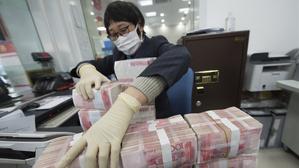 A teller counts cash at a bank branch in Nantong, Jiangsu province, on Thursday. (XU JINBAI / FOR CHINA DAILY)
A teller counts cash at a bank branch in Nantong, Jiangsu province, on Thursday. (XU JINBAI / FOR CHINA DAILY)
Chinese authorities are expected to use monetary tools and strengthen government spending to slow the weakening of economic activity due to the novel coronavirus outbreak, and to ensure ample liquidity to prevent a sharp sell-off when financial markets reopen on Monday.
As the reported number of cases of infection is rising, the government has undertaken drastic measures to contain the virus, including extending the holiday, blockading roads and putting off the opening of schools. Financial trading has also been stopped until this weekend.
Transactions and settlements in the interbank lending, bond, foreign exchange markets, as well as the gold and bill markets, have been suspended, in line with the requirements of the State Council, to prevent and control novel coronavirus infections. The financial markets mentioned above, which have been closed since Jan 23, will reopen on Monday.
As there is a "large amount of funds" coming due when the markets reopen, the People's Bank of China, the central bank, will inject sufficient liquidity in a timely manner to maintain reasonably ample liquidity in the banking system, said a statement on Tuesday.
The PBOC will use monetary policy tools, such as open market operations, to achieve the objectives, the statement said.
The authorities are increasing government spending to fight the virus. As of Wednesday, central and local governments had allocated 27.3 billion yuan (US$3.9 billion) of subsidies for epidemic prevention and control, the Ministry of Finance reported on Thursday morning.
A meeting of the State Council said on Wednesday tax and financial policies would be launched to support companies offering medical supplies.
More detailed measures may be unveiled in coming days, including lowering the interest rate level via the PBOC's lending facilities, and conducting open market operations to inject liquidity, and encourage commercial banks to extend credit to help companies and households that are likely to suffer more from the virus outbreak, said Lou Feipeng, a senior economist at Postal Savings Bank of China.
Some large banks, including China CITIC Bank, have already said they will lower the lending rate for companies affected by the novel coronavirus.
In order to prevent and control the epidemic, the Chinese government extended the Lunar New Year holiday, and some provinces including Zhejiang, Jiangsu, and Guangdong, all manufacturing centers, forbade almost all companies in those regions from resuming operations before Feb 9.
"That means the demand for loans of a large number of enterprises will decline, given the weakened domestic demand in the short term, which will also lead to a decrease of deposits generated from loans," Lou added. "The liquidity of the banking system is facing a tightening condition, especially amid the virus outbreak."
But China and other countries in the Asia-Pacific region have "substantial financial buffers and room for further policy easing to offset any short-term hit to economic activity from the outbreak, but their resilience to any health crisis would ultimately depend on its scale," said Colin Mansfield, director of Fitch Ratings' US Corporates.
As the scale of the current Wuhan coronavirus outbreak is continually expanding, economists have found it difficult to predict the full impact on China's and the global economy. Some conservative estimates say the coronavirus outbreak may drive down China's economic growth by more than 0.5 percent.
"The coronavirus could deal a more severe blow to China's economy in the near term relative to SARS in 2003," said Lu Ting, chief economist in China with Nomura Securities. Owing to the SARS outbreak, real GDP growth plunged by 2 percentage points from the first quarter to the second in 2003.
But a positive message is that the coronavirus may prove to be only a temporary shock and may not necessarily leave a long-lasting impact, according to Lu. "We expect a V-shape recovery due to some strong pent-up demand as well as pent-up production following the potential containment of the coronavirus."
To counter the economic slowdown, especially in the first quarter, the Chinese government is expected to introduce a raft of measures to provide liquidity and credit support to the economy, especially to those business owners severely hit by the epidemic, Lu said.
"The foremost risk around the coronavirus infections in and outside China is human health related, and borne by those exposed to infection," said Atsi Sheth, managing director, Moody's Investors Service. "Should the incidence of infections escalate, it could also have economic consequences, as the SARS epidemic of 2003 demonstrated."


